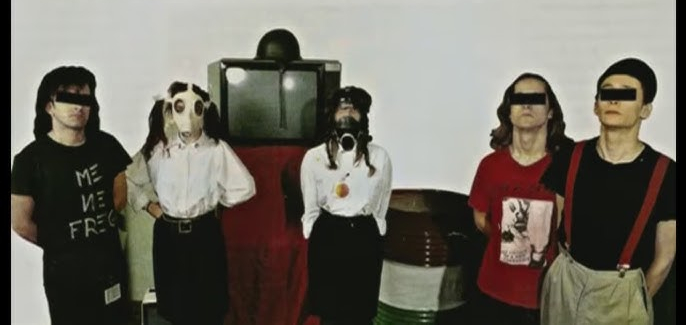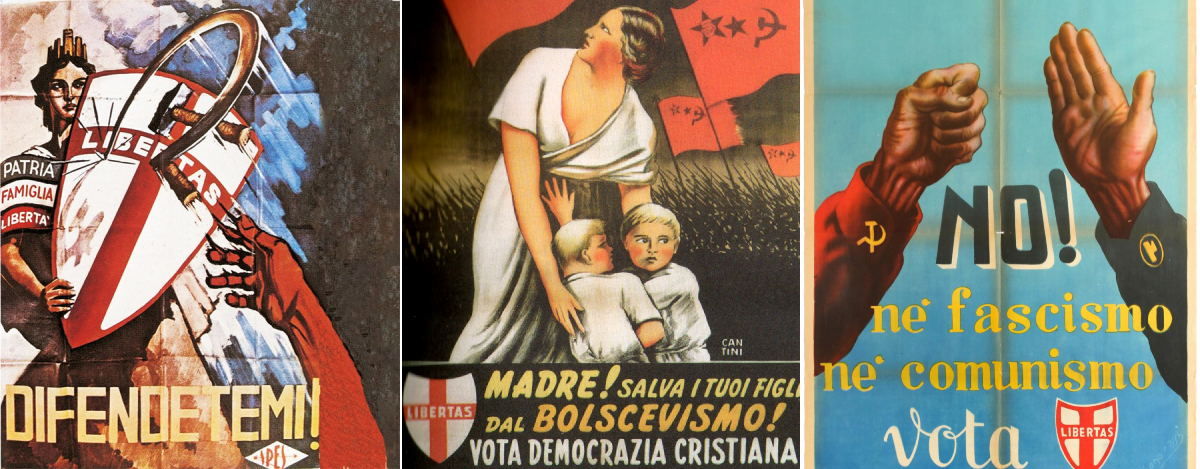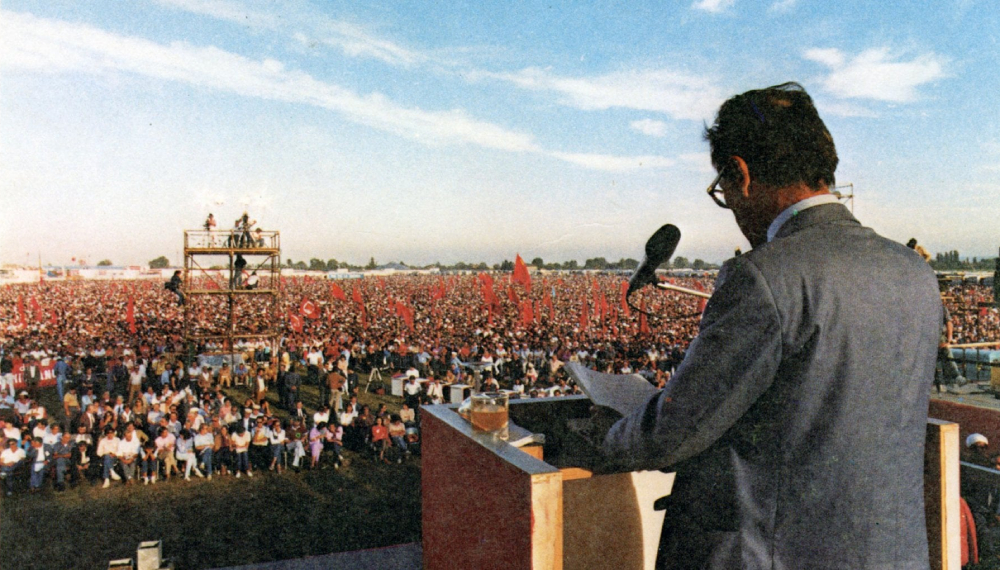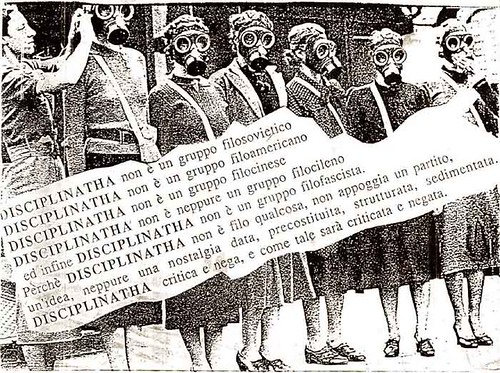
What is the most reactionary art you enjoy? Ted Nugent? Little Britain? Combat games with the Western military-industrial complex's barely-concealed imperialist agenda lurking underneath? You are like a little baby. Read this.
I want to talk about a band whose deliberately chosen angle of attack made them pariahs in their own country, and incomprehensible unknowns outside of it. A band whose early gigs sparked violent confrontations between themselves, far-right skinheads, anti-fascist punks and riot police; a band who relished the confrontation even when it led to their being physically and verbally abused on and off stage, and who Jello Biafra proclaimed "the only Italian band worth listening to".
This is a band I've been obsessively writing and re-writing thousands of words about for the last three years, unable to firmly decide how I feel about them, but ultimately deciding that my own feelings are irrelevant to their strange and problematic story, and deciding to publish it on this date whose significance will hopefully become apparent.
I want to tell you the story of Disciplinatha, which as far as I'm aware has never been done in English, but first I need you to understand a few things about a country that no longer exists. I need you to tell you about Italy (1948-1994).
The First Republic
Fascism, eh? What were that all about then? After Benito Mussolini's ousting from power, one of his highest ranking military officers and the orchestrator of the Libyan genocide somehow evaded justice and became prime minister of the Kingdom (soon to be Republic) of Italy.
In a country where the dictator would, by the end of the war, find himself strung up like a provolone, with many of his former subjects hoping to extend the same treatment to his ministers and officers, the rehabilitation of fascist war criminals like Pietro Badoglio would not have been possible without the endorsement of the Brits and Americans, who were becoming increasingly wary of their own Soviet allies and were seeking anti-communist support on the continent wherever they could find it. And this was before Operation Gladio was even a twinkle in the CIA's eye.
Apropos of nothing: at the time of writing, Italy's prime minister is a neofasc--sorry, national conservative - who has enjoyed glowing admiration and support from no less than three consecutive British leaders.

Benito to Clara: "How's it hanging?"
By the late 1940s, an "acceptable" compromise between fascism and communism had been found: a generously American-funded centre-right political party called Christian Democracy, aka "The Crossed Shield". In an election that was decisvely swung by a massive anti-communist scare campaign, the Christian Democrats defeated the left-wing Popular Democratic Front (made up of communists, socialists and ex-partisans) to assume a grip on power which they would not relinquish for almost half a century.

Some of the DC's less unhinged election material.
Needless to say, the conflicting elements of Italian society that took up arms for Il Duce and those who fought tooth and nail for freedom and socialism weren't going to magically disappear overnight, and the subsequent decades of political violence known as the Years of Lead reached their horrific peak in the strategically-targeted neofascist bombing of Bologna Central railway station. But what was so special about Bologna?
Red flags
"Bologna was like a Soviet enclave deep inside NATO territory." - Dario Parisini
Like the village of indomitable Gauls in Asterix and Obelix, one Italian region stood firm against the Christian "Democrats" and become known as a socialist stronghold in which the Partito Comunista Italiano, at one time the largest and strongest communist party in the West, regularly won safe electoral majorities at every level from regional on down. Emilia-Romagna, the reddest notch in the country's Red Belt , is where you will find Bologna, "La Rossa".

PCI national secretary Enrico Berlinguer addressing a rally in Tirrenia, Pisa, 1982
And it is in that fair city, whose political orientation is redder than the terracotta that many of its oldest buildings are made of, that a trip back in time to the early 1980s, just two years after the right wing terrorist massacre that claimed 85 souls, introduces us to a post-punk band by the name of CCCP Fedeli Alla Linea ("Faithful to the Line").
CCCP perfectly nailed their music as "Emilian Melodic Music-Philo-soviet punk", influenced as much by the proletarian folk song traditions of the Emilian region as by post-punk, dub and new wave and, in case the name didn't make it clear, the aesthetics and philosophy of the USSR. Uniting swirling keyboard arrangements, shrill guitars and cheap, scratchy drum machines, the trio of Giovanni Lindo Ferretti, Massimo Zamboni and Umberto Negri made an artful racket that expressed nostalgic yearning for what the USSR once was and saudade for a socialist Italy that never was.
Beyond the stakhanovite bombast, however, CCCP still sang about the everyday frustrations of growing up in Western society like any other punk band. Even in the socialist utopia of Emilia-Romagna, being young could mean feeling directionless, unfulfilled, apathetic: "I don't study, I don't work, I don't watch TV / I don't go to the movies, I don't do sports" (Io Sto Male / "I Feel Bad").
Thanks to relatable themes like these endearing them to disaffected younger Emilians, and their unassailably left wing positions assuring the older generation of communists and ex-partisans that the kids were alright, CCCP Fedeli Alla Linea soon became darlings of the Italian alternative scene, enjoying the kind of national prestige and recognition for which I can't even think of a British equivalent. Maybe the Smiths before everybody realised what a terrible cunt that Stephen Morrissey is.
"You won't understand Disciplinatha without knowing anything about CCCP." - Daniele Albertazzi
Out of the greater Bologna area's staunchly left wing underground scene came a group of malcontents so utterly depraved and nihilistic in their outlook that they decided to form a group with the intention of breaking the ultimate taboo that no post-war Italian artist in any medium had even dared approach: fascism.
Black flags

"DISCIPLINATHA is not a pro-Soviet group
DISCIPLINATHA is not a pro-American group
DISCIPLINATHA is not a pro-Chinese group
DISCIPLINATHA is not a pro-Chilean group either
and finally DISCIPLINATHA is not a pro-fascist group.
Because DISCIPLINATHA isn't pro-anything, it doesn't suport a party, an idea, not even a given, pre-established, structured, sedimented nostalgia.
DISCIPLINATHA criticises and denies, and as such will be criticised and denied."
The roots of Disciplinatha lie in some no-mark punk act called Blood, or possibly The Blood (the Italian tradition of adding the definite article to band names continues to baffle me, one minute they're talking about "i Beatles", the next it's "i The Fall", and don't get me started on "i Metallica"). According to former bassist Marco Maiani, "music was no longer enough" for (the) Blood, and so, with the help of one Dario Parisini, they set about printing their own zine, already provocatively titled Fiamma Nera (Black Flame) and only getting more upsetting from there on in.
This charming little bundle of cut-n-pasted fascist-era photographs, slogans and newspaper headlines found its way onto a stand promoting upcoming local musical artists at Bologna's annual Festa de l'Unità (a festival around the PCI's official newspaper; a bit like if the Morning Star threw an annual fair). Their contribution went down like a pint of cold vomit in a hot sauna: every last copy was torn up and binned. The group of miscreants knew it was onto something. In vocalist Cristiano Santini's words: "We understood that we'd pressed the right buttons".
Disciplinatha followed up this action with their first album, Abbiamo Pazientato 40 Anni: Ora Basta!, just over twenty-four minutes of black-hearted, black-pilled, black-shirted nihilism in musical form.
From the opening Mussolini speech from which the album takes its title to the horribly compelling airstrike of screaming guitar feedback ("Attacco dal Cielo") that closes it, not one single breath or note is wasted on this entire record. Every last detail has been carefully chosen to cause the maximum audiovisual whiplash in listeners of any nationality but especially Italians and especially their parents' generation of proud Emilian partisans.
It's ugly, it's nasty, it's a mean-spirited rejection of everything CCCP Fedeli Alla Linea stood for, and it's by far the most original Italian take on punk rock ever recorded.
Unsurprisingly, a band running these kinds of colours up the mast immediately ran into difficulties, firstly with distribution of Abbiamo Pazientato... and then with booking gigs: "Listen, your music is great, but my grandpa was a partisan, and I don't want fascist bastards playing in my venue." (second-hand quote from the excellent Disci-doc This Is Not An Exercise).
The irony is that a band with genuine far-right beliefs would have found a welcoming support network amongst likeminded promoters and bands, not just in Italy but in Germany, the UK and, a few years later, in former East Bloc countries where the relaxing of communist era censorship allowed violent, Combat 18-affiliated neo-Nazi promoters like Blood And Honour to connect the likes of Skrewdriver with a wider international audience.
But Disciplinatha stood alone in their Italian idiosyncracy, blacklisted by Rai 2 and unwelcome at even some of Italy's sketchiest venues. The few gigs that did go ahead drew an understandably hostile reaction from leftist punks and occasionally violence from fascists who correctly sussed that the scrawny rockers in combat gear weren't professing a sincere affection for their Duce. What little footage that survives of these early gigs shows a young, hungry, mean and lean band throwing together everything they've got - punk aggression, searing metallic feedback, industrial samplings, information bombardment - in service of a sound that can only be described as pura cattiveria.
Disciplinatha perform to a disappointingly well-behaved hometown audience in 1989.
"I saw all these riot police lined up in front of the stage before we went on and I thought, that's fantastic, that's the stage show I've always dreamed of." - Valeria Cevolani
Any readers previously unacquainted with Disciplinatha must surely be asking themselves by now: "excuse me, but are these guys a fascist band?". To which the short answer is "no", but that then invites the rather longer discussion of "so why do they walk and quack like one?".
That, my friends, is a very good question, and one which we will address in part II.
